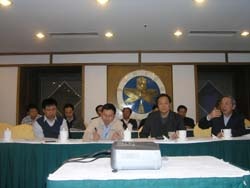Dec 4 2008
Under the theme of nano- and molecular materials and devices, the 337th session of the Xiangshan Science Conferences convened from 2 to 4 December in Beijing. This symposium was chaired by Prof. ZHU Daoben from the CAS Institute of Chemistry, Prof. TONG Zhenhe from the CAS Technical Institute of Physics and Chemistry, Prof. GAO Song from School of Chemistry and Molecular Engineering, Peking University and Prof. ZHANG Xi from Department of Chemistry, Tsinghua University.

The nano- and molecular materials and devices are featured with small dimension and large interface, as well as a series of new effects (namely, the effects of small size, interface, and quantum). In addition, their structures are easy to determine. Therefore, they demonstrate many unique physical characteristics and performance that do not exist in bulk materials, which provide promising prospects for their application to a wide range of fields, including micro-electronics, bio-medicine and the military. As a result, they have become a major subject of many researchers.
While enjoying dynamic development, however, the research in this field is facing significant challenges in searching for approaches for their controllable preparation (in terms of size, length, and dimension; methods for developing such materials and devices with novel properties via structure design and control; ways to reveal their molecular and structural properties and the process of their self-assembly; and the strategy for developing technologies that could promote the application of nano- and molecular materials in devices; and research into the structure properties of single molecules and molecular devices. their strong points to be used in developing new elements and devices.
With an objective of promoting the development of nano-molecular materials and devices in China and strengthening the cooperation in the fields, the conference invited experts from across the country to have discussions on the following issues: design and synthesis of nano-materials and devices; .physical and chemical properties of nano-materials and their controllable assemblage; and nano-materials and devices.
A central roundup report on nano-molecular materials and devices was delivered by Prof. ZHU Daoben. Other topics of reports included fundamentals of molecular spintronics by Prof. XUE Qikun; molecular magnetism and molecular spintronics by Prof. GAO song; and interface study & engineering for molecular electronics by Prof. Li Shutang.